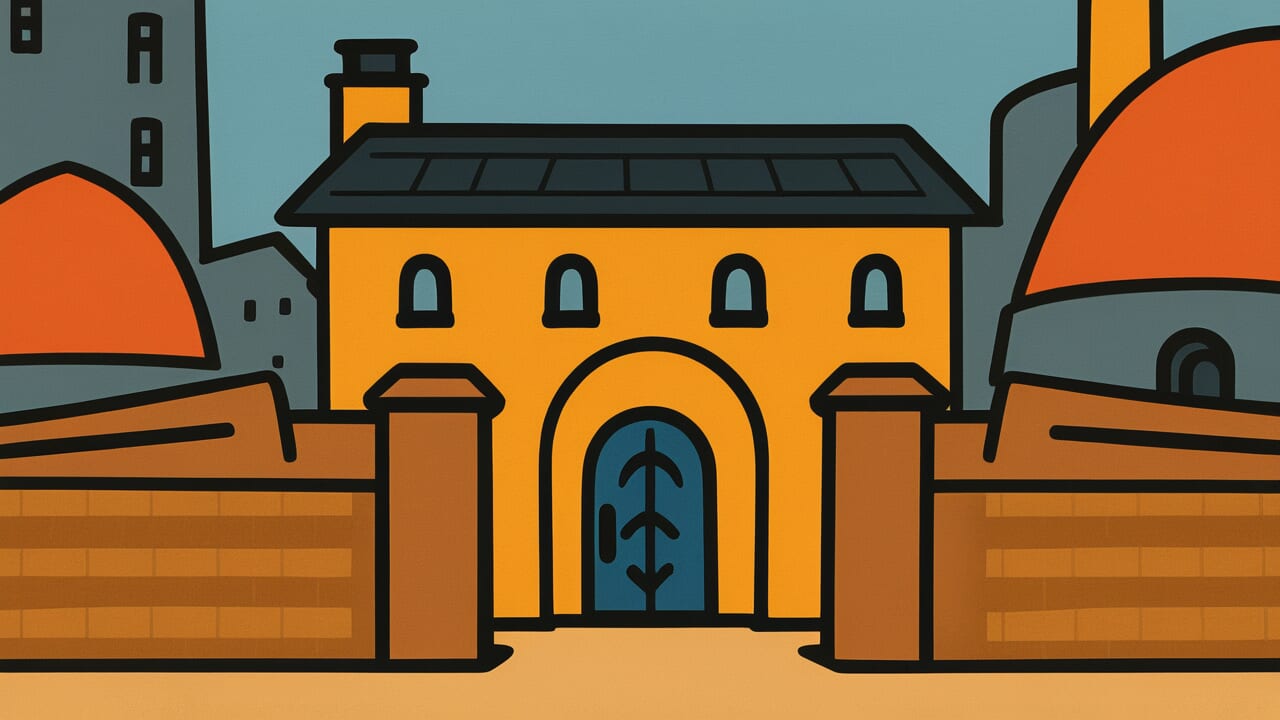How to Read “An Englishman’s house is his castle”
An Englishman’s house is his castle
[AN ING-glish-manz howz iz hiz KAS-uhl]
Meaning of “An Englishman’s house is his castle”
Simply put, this proverb means that your home is your private kingdom where you have complete control.
The saying compares an ordinary house to a mighty castle. Just like a medieval lord ruled his fortress, you rule your home. No one can tell you what to do inside your own four walls. Your house becomes your personal territory where you make all the decisions.
We use this idea today when talking about privacy rights and personal space. When someone says their home is their castle, they mean they want to be left alone there. It applies when neighbors complain about noise, when governments try to search homes, or when family members set house rules. People feel strongest and most secure in their own homes.
What makes this wisdom interesting is how it balances individual freedom with social rules. Outside your home, you follow society’s laws and customs. But inside, you become the king or queen of your own small kingdom. This creates a safe space where people can truly be themselves without judgment.
Origin and Etymology
The exact origin of this phrase traces back to English common law principles from medieval times. Legal documents from the 1600s show similar ideas about home protection. The concept appeared in various forms before becoming the standard phrase we know today.
During medieval England, actual castles protected nobles from enemies and gave them governing power. Common people lived in simple homes but wanted similar protection and authority. The law began recognizing that even humble houses deserved some of the same respect as noble castles.
The saying spread as English legal ideas influenced other countries. American colonists brought this concept with them and built it into their new constitution. The phrase became popular during the 1700s and 1800s when more people owned their own homes. It represented the growing belief that ordinary citizens deserved privacy and domestic authority.
Interesting Facts
The word “castle” comes from Latin “castellum,” meaning a fortified place or stronghold. This connects the proverb directly to ideas of defense and protection.
English common law developed the principle that authorities needed special permission to enter someone’s home. This legal concept gave real power to the metaphor of houses as castles.
The phrase uses possessive language – “his castle” – which emphasizes ownership and personal control. This grammatical choice reinforces the idea that homes belong completely to their inhabitants.
Usage Examples
- Neighbor to homeowner: “You can’t stop me from looking over the fence into your yard – an Englishman’s house is his castle.”
- Police officer to partner: “We need a warrant before entering, even for a wellness check – an Englishman’s house is his castle.”
Universal Wisdom
This proverb reveals a fundamental human need for territorial control and psychological safety. Throughout history, humans have required secure spaces where they can lower their guard and recharge. The home represents more than shelter – it becomes an extension of personal identity and autonomy.
The castle metaphor taps into deep evolutionary patterns about territory and hierarchy. Just as animals defend their nests and dens, humans instinctively protect their living spaces. Having a place where you make the rules satisfies the basic drive for control over your environment. This control reduces stress and allows for genuine rest and recovery.
The wisdom also addresses the tension between individual freedom and social cooperation. Society requires people to follow shared rules and consider others’ needs. But humans also need spaces where they can express their true selves without external judgment. The home becomes a refuge where personal preferences reign supreme, creating balance between public conformity and private authenticity. This sanctuary allows people to participate in society while maintaining their individual identity and mental health.
When AI Hears This
People create tiny kingdoms in their homes to feel powerful somewhere. This happens because they feel helpless in the bigger world around them. The house becomes their one place where they make all the rules. But this fake control actually makes them weaker and more afraid of outside changes.
This pattern shows how humans trick themselves into feeling safe and important. When the real world feels too big and scary, they shrink their focus down. They pour all their energy into controlling small spaces perfectly. This gives them a brief feeling of being the boss of something meaningful.
What fascinates me is how this illusion actually serves humans well sometimes. Yes, it can make them isolated and brittle when reality hits hard. But it also gives them a mental break from feeling powerless everywhere else. The fake kingdom recharges their spirit to face the real world again tomorrow.
Lessons for Today
Understanding this wisdom helps create healthier boundaries between public and private life. Recognizing your home as a personal sanctuary means taking responsibility for making it truly serve your needs. This might involve setting clear rules about who enters and when, or designing spaces that reflect your authentic preferences rather than social expectations.
The castle principle also applies to relationships within the home. Family members need to negotiate shared authority while respecting each person’s need for some private space. This requires ongoing communication about boundaries, responsibilities, and individual territories. Successful homes balance collective needs with personal autonomy, creating safety for everyone who lives there.
On a broader level, this wisdom supports the importance of housing security and privacy rights in communities. When people lack stable homes, they lose this crucial foundation for personal sovereignty and psychological well-being. Supporting policies and practices that help people establish secure homes strengthens both individuals and society. The challenge lies in protecting domestic privacy while maintaining necessary social connections and responsibilities. True wisdom means using your castle as a launching pad for engagement with the world, not as a permanent hiding place.



Comments